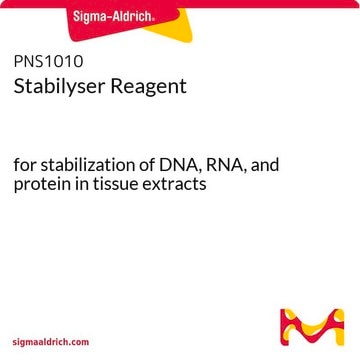62001-046
DNAgard® Tissue
100 mL bottle, for room temp preservation of DNA
About This Item
Productos recomendados
grade
for molecular biology
form
liquid
usage
200 reactions
storage temp.
room temp
Features and Benefits
- Protects DNA in tissues, cells and biopsy material from degradation at room temperature
- Compatible with most downstream applications, e.g., PCR, qPCR and sequencing.
- Optional dry-down feature allows for long-term storage
- Reduces storage and shipping costs and improves lab space management
Packaging
Legal Information
Related product
signalword
Danger
hcodes
Hazard Classifications
Eye Dam. 1
Storage Class
10 - Combustible liquids
wgk_germany
WGK 3
flash_point_f
Not applicable
flash_point_c
Not applicable
Certificados de análisis (COA)
Busque Certificados de análisis (COA) introduciendo el número de lote del producto. Los números de lote se encuentran en la etiqueta del producto después de las palabras «Lot» o «Batch»
¿Ya tiene este producto?
Encuentre la documentación para los productos que ha comprado recientemente en la Biblioteca de documentos.
Contenido relacionado
Semen samples are often collected at multiple geographic sites for DNA testing. Current practice is to snap-freeze and transport samples on dry-ice to a suitable centre.
Nuestro equipo de científicos tiene experiencia en todas las áreas de investigación: Ciencias de la vida, Ciencia de los materiales, Síntesis química, Cromatografía, Analítica y muchas otras.
Póngase en contacto con el Servicio técnico









